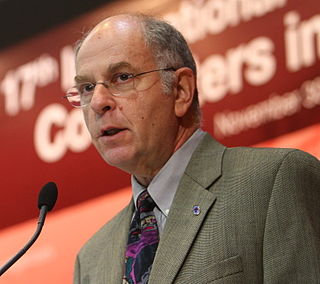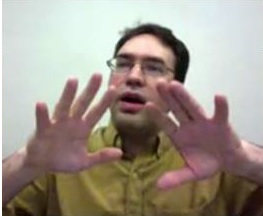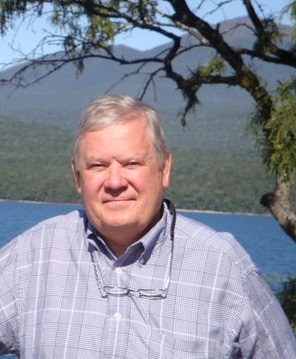Timothy J. Hickey is a professor of computer science and former Chair of the Computer Science and Internet Studies Program (INET) at Brandeis University.
John Robert Anderson is a Canadian-born American psychologist. He is currently professor of Psychology and Computer Science at Carnegie Mellon University.
Patrick Colonel Suppes was an American philosopher who made significant contributions to philosophy of science,the theory of measurement,the foundations of quantum mechanics,decision theory,psychology and educational technology. He was the Lucie Stern Professor of Philosophy Emeritus at Stanford University and until January 2010 was the Director of the Education Program for Gifted Youth also at Stanford.
Philip H. Winne is a professor of educational psychology and former Canada Research Chair in Self-Regulated Learning and Learning Technologies at Simon Fraser University. A Fellow of the American Educational Research Association,the American Psychological Association,the Association for Psychological Science,and the Canadian Psychological Association,Winne has made significant contributions to research on self-regulated learning. He is the principal investigator of the Learning Kit Project,which has developed educational software,now called nStudy,founded on principles of self-regulated learning.
Edward Bruce Burger is an American mathematician and President Emeritus of Southwestern University in Georgetown,Texas. Previously,he was the Francis Christopher Oakley Third Century Professor of Mathematics at Williams College,and the Robert Foster Cherry Professor for Great Teaching at Baylor University. He also had been named to a single-year-appointment as vice provost of strategic educational initiatives at Baylor University in February 2011. He currently serves as the president and CEO of St. David's Foundation.
Luis Radford is professor at the School of Education Sciences at Laurentian University in Sudbury,Ontario,Canada. His research interests cover both theoretical and practical aspects of mathematics thinking,teaching,and learning. His current research draws on Lev Vygotsky's historical-cultural school of thought,as well as Evald Ilyenkov's epistemology,in a conceptual framework influenced by Emmanuel Levinas and Mikhail Bakhtin,leading to a non-utilitarian and a non-instrumentalist conception of the classroom and education.
Jianqing Fan is a statistician,financial econometrician,and data scientist. He is currently the Frederick L. Moore '18 Professor of Finance,Professor of Operations Research and Financial Engineering,Professor of Statistics and Machine Learning,and a former Chairman of Department of Operations Research and Financial Engineering (2012–2015) and a former director of Committee of Statistical Studies (2005–2017) at Princeton University,where he directs both statistics lab and financial econometrics lab since 2008.

Howard Charles Wainer is an American statistician,past principal research scientist at the Educational Testing Service,adjunct professor of statistics at the Wharton School of the University of Pennsylvania,and author,known for his contributions in the fields of statistics,psychometrics,and statistical graphics.
Professor Tom Lowrie was appointed a Centenary Professor at the University of Canberra,Australia,in 2014. He has an established international research profile in the discipline area of STEM education and mathematics education.

Gerry Stahl is an American computer scientist specializing in computer-supported collaborative learning. He is professor emeritus of computing and informatics at Drexel University,and was the founding editor-in-chief of the International Journal of Computer-Supported Collaborative Learning.

Nathalie Michelle Sinclair is a Canadian researcher in mathematics education who holds the Canada Research Chair in Tangible Mathematics Learning at Simon Fraser University in Vancouver.
Robert B. Davis was an American mathematician and mathematics educator.

Ryan S. Baker is professor of education and computer science at the University of Pennsylvania,and also directs the Penn Center for Learning Analytics. He is known for his role in establishing the educational data mining scientific community,for the Baker Rodrigo Ocumpaugh Monitoring Protocol (BROMP),and for establishing the first automated detector of student disengagement. He was awarded the Educational Research Award for 2018 by the Council of Scientific Society Presidents.
Ivor Frederick Goodson is a British educationalist. He is a professor at Tallinn University.
Samuel Oye Bandele is a Nigerian academic and is the Vice Chancellor of Anchor University in Lagos.
Krista Renee Muis is a Canadian professor and Canada Research Chair in epistemic cognition and self-regulated learning at McGill University. Muis was elected a member of the College of New Scholars of the Royal Society of Canada in 2018.

Gary Bitter is an American researcher,teacher,and author focusing on educational technology. He is Professor of Educational Technology and past Executive Director of Technology Based Learning and Research at Arizona State University. He was a founding board member of the International Society for Technology in Education and served as its first elected president. He is the co-author of the National Technology Standards (NETS) which have been used extensively as a model for National and International Technology Standards.
Gila Hanna is a Canadian mathematics educator and philosopher of mathematics whose research interests include the nature and educational role of mathematical proofs,and gender in mathematics education. She is professor emerita in the Department of Curriculum,Teaching and Learning at the University of Toronto,affiliated with the Ontario Institute for Studies in Education,the former director of mathematics education at the Fields Institute,and the founder of the Canadian Journal of Mathematics,Science and Technology Education.
Anna Sierpińska was a Polish-Canadian scholar of mathematics education,known for her investigations of understanding and epistemology in mathematics education. She was a professor emerita of mathematics and statistics at Concordia University.
Jeremy Kilpatrick was an American mathematics educator. He received the Felix Klein Medal for 2007 from ICMI. He graduated from Chaffey two-year college in California (1954),then he went to the University of California at Berkeley to earn an A.B degree (1956) in mathematics and after an M.A degree (1960) in education. He received his M.S. in mathematics in 1962 and his PhD degree in mathematics education in 1967,both from Stanford University,where he was also a research assistant in the SMSG (1962-1967). His dissertation was supervised by Edward Begle with George Pólya and Lee Conbrach in the doctoral committee,and addressed eight graders’problem-solving heuristics. From 1967 to 1975 he taught from as an assistant and later as an associate professor at Teachers College,Columbia University,in New York. In 1975,he moved to the University of Georgia,where he was a professor of mathematics education.





